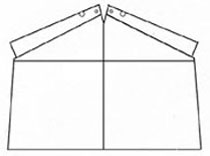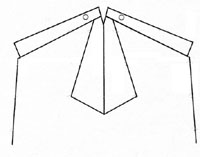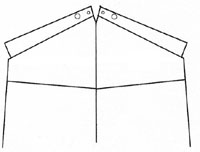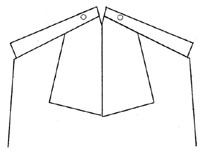
The following drawings show, in very general terms, some of the pattern
differences between the most
common styles of reproduction trousers available today.

This pattern is marked by a straight waist band about 1 1/2 inch in
front, tapering to
3/4 inch in the rear), a yoke shapped gusset in the
back, the back raised, a watch pocket with
an exterior facing, and
side pockets that start below the waist band. The vent in the trouser
cuff is generally shallow.

This pattern is marked by a slightly curved waist band (not shown)
about 2 inchs
in front, tapering to 3/4 to 1 inch in the rear), two
trapizoid shapped inserts for the gusset in
the back, the back raised,
a watch pocket with an exterior facing, and side pockets that start
below the waist band.

Simular to the Schuylkill pattern, the William Dearing pattern also
has a yoke type
back. Unlike the Schuylkill, pattern however, the
Dearing yoke is taller and may or may not slant
downwards. Like
J. T. Martin patern it has a tapering waist band which is somewhat
curved. Unlike
the Schuylkill or Martin pattern the watch pocket in
the Dearing pattern is sewn into the waistband amd
has no external
facing.

Simular to the J. T. Martin pattern, the Harkness pattern also
employs 2 trapizoid
inserts for a gusset. Generally the Harkness
pattern trapizoids are broader and somewhat more square
than
those in the Martin pattern. The waiste band is again somewhat
curved and tapered. Watch
pockets most often are sewn into the
waist band with no exterior facing.